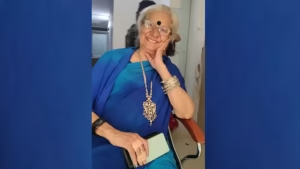Life lessons from Sudha Murthy

Sudha Murthy is an Indian educator, author, and philanthropist who is the chairperson of the Infosys Foundation. She advises parents to give space to their children. She says giving them space will give them a chance to rethink and take well-thought decisions. She also advises parents to live simple life because parents are role models to their children.
Parents can learn a lot from the 72-year-old, who came from a humble background and is a recipient of one of the highest civilian awards in the country, the Padma Shri. Regardless of her successes, she chooses to live a modest life. She understands the value of her hard work and urges people to never forget the most important thing in life – knowledge.
In an interview with a video content-creating platform, the author-philanthropist talks about three things that she prioritizes in life. Here’s what parents can take away from it.
Never feel ashamed to ask for a discount
Rich people don’t bargain or ask for discounts or so people believe. However, Sudha Murthy doesn’t think so. She says it’s her “right” and a “privilege.”
“Everyone asks for a discount, what’s wrong with that? I have a small purse where I have two telephones, a mask, a bindi, and a handkerchief. That’s all I carry and no money in that. When I go to a bookshop, I buy books and I tell them to send me the… no, I ask, “I am an author, give me an author’s discount. Send the bill to my office and tomorrow I will pay,” she reveals.
However, the 72-year-old is against asking for a discount from street vendors. She says, “Everywhere I ask discount, what is wrong with that? Except I don’t ask for discounts when I go to villages for my work, etc. I talk to the vegetable vendors. I talk to them about what is the weather, how much is the rate, how much they get, whether have they been following the family planning after two children, whether they have been operated, on or vaccinated, what kind of water they drink… all these things, and then I buy vegetables in the end. Whatever rate they say, I will never take cheap. I never ever bargain with street vendors, flower vendors, vegetable vendors.”
Knowledge over material things
Talking about an upgrade of her lifestyle, Murthy says, “I upgraded my lifestyle a lot. I have lots of books. Initially, I was not able to afford to buy books. Today I can buy any book, any number of copies. This I see as upgrading life. I can travel to any part of India and the world to learn more at any moment in time. I have upgraded my life.”
However, the children’s author highlights that her upgrade in life could be different from other people’s upgrades.
“For me, upgrading is what I like and my liking is the search for knowledge… but for most people,
upgrading means wearing a sari, that’s never my fascination. For the last 27 years, I stopped buying
saris,” she reveals.
Living life ‘the moderate middle-class way’
Going back the memory lane, Murthy talks about her childhood and where she comes from. She shares, “My grandfather was a high school teacher, and history teacher and my mother was a school teacher. My father was a college professor and doctor. So we always grew up with books, not with money. We didn’t have extraordinary money, we had enough money to stay, and survive. But books were much more important to us. It was a simple childhood with no complications. Every small thing was a joy.”
On raising kids
Murthy acknowledges the fact that her children did not grow up in the same environment as her and therefore come from a more privileged background. This is why it was ‘the hardest’ to bring up her children in a very moderate way.
“So the best thing I thought was, I will continue to live in the moderate middle-class way and take children to my work, my social work so that they get to see how other people live. I used to tell my children, “Look at them, they are as smart as you are”.
They are born on the other side of the line and it may be hard for them to study well. So it’s your duty to help them,” she shares.
As per the author, children do not require anyone else as their role model, their parents are their role models.
Staff Reporter









